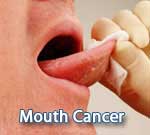Squamous Neck Cancer
Followup Care:
NutritionSome people who have had treatment for cancer of the larynx may lose their interest in food. Soreness and changes in smell and taste may make eating difficult. Yet good nutrition is important. Eating well means getting enough calories and protein to prevent weight loss, regain strength, and rebuild healthy tissues.
If eating is difficult because your mouth is dry from radiation therapy, you may want to try soft, bland foods moistened with sauces or gravies. Thick soups, puddings, and milkshakes often are easier to swallow. The nurse and the dietitian will help you choose the right foods.
After surgery or radiation therapy, some people need feeding tubes placed into the abdomen. Most people slowly return to a regular diet. Learning to swallow again may take some practice with the help of a nurse or speech pathologist. Some people find liquids easier to swallow; others do better with solid foods. You will find what works best for you
Living with a Stoma
Learning to live with the changes brought about by cancer of the larynx is a special challenge. The medical team will make every effort to help you return to your normal routine as soon as possible.
If you have a stoma, you will need to learn how to care for it:
- Before leaving the hospital, you will learn to remove and clean the trach tube, suction the trach, and care for the skin around the stoma.
- If the air is too dry, as it may be in heated buildings in the winter, the tissues of the windpipe and lungs may produce extra mucus. Also, the skin around the stoma may get sore. Keeping the skin around the stoma clean and using a humidifier at home or at the office can lessen these problems.
- It is very dangerous for water to get into the windpipe and lungs through the stoma. Wearing a special plastic stoma shield or holding a washcloth over the stoma keeps water out when showering or shaving. Other types of stoma covers—such as scarves, neckties, and specially made covers—help keep moisture in and around the stoma. They help filter smoke and dust from the air before it enters the stoma. They also catch any fluids that come out of the windpipe when you cough or sneeze. Many people choose to wear something over their stoma even after the area heals. Stoma covers can be attractive as well as useful.
- When shaving, men should keep in mind that the neck may be numb for several months after surgery. To avoid nicks and cuts, it may be best to use an electric shaver until the numbness goes away.
People with stomas work in almost every type of business and can do nearly all of the things they did before. However, they cannot hold their breath, so straining and heavy lifting may be difficult. Also, swimming and water skiing are not possible without special instruction and equipment to keep water from entering the stoma.
Some people may feel self-conscious about the way they look and speak. They may be concerned about how other people feel about them. They may be concerned about how their sexual relationships may be affected. Many people find that talking about these concerns helps them. Counseling or support groups may also be helpful
Followup Care
Followup care is important after treatment for cancer of the larynx. Regular checkups ensure that any changes in health are noted. Problems can be found and treated as soon as possible. The doctor will check closely to be sure that the cancer has not returned. Checkups include exams of the stoma, neck, and throat. From time to time, the doctor may do a complete physical exam and take x-rays. If you had radiation therapy or a partial laryngectomy, the doctor will also examine you with a laryngoscope.
Treatments for laryngeal cancer can affect the thyroid. A blood test can tell if the thyroid is making enough thyroid hormone. If the level is low, you may need to take thyroid hormone pills.
People who have laryngeal cancer have a chance of developing a new cancer in the mouth, throat, or other areas of the head and neck. This is especially true for those who are smokers or drink alcohol heavily. Most doctors strongly urge their patients to stop smoking and drinking to cut down the risk of a new cancer and other health problems.
The NCI has prepared a booklet for people who have completed their treatment to help answer questions about followup care and other concerns. Facing Forward Series: Life After Cancer Treatment provides tips for getting the most out of medical visits. It describes the kinds of help people may need.





































